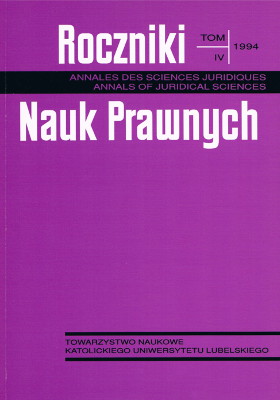Podmiotowość rodziców w zakresie religijnego i moralnego wychowania dzieci w ramach edukacji szkolnej
Abstrakt
The subject-matter of the present consideration here is the protection of parents’ rights to religious and moral upbringing of their children within the frameworks of school education. The paper has taken into account the axiological, legal ad comparative aspects.
First the axiological reasons have been pinpointed. They are the following: dignity of the human person and human rights which result from it, i.e. 1) man’s right to religious freedom which embraces his right to teaching religion and moral principles; 2) man’s right to upbringing; 3) parents’ and legal protectors right religious and moral upbringing of children according to their beliefs.
Then the paper discusses the protection of these rights in various legal systems, that is: 1) in international conventions dealing with the respect for man’s rights of universal and regional scope with particular emphasis on the European Convention on internal Human Rights and Fundamental Freedoms; 2) in the home law of the modern states among which one has distinguished the following models: lay states neutral in the negative sense (American and French models), the states of totalitarian communism, and the democratic states neutral in the positive sense.
In view of a comparative analysis of these legal systems the author states that the protection of parents’ rights to religious and moral upbringing of their children is an integral element of the European legal culture. This protection embraces the following: 1) parents’ rights to choose private schools for their children in which education corresponds to their beliefs, and 2) parents’ right to decide so that their children could have religious instruction at public schools. In relation to what kind of statement the parents have to make in view of this matter, one can distinguish two systems of religious instruction in public schools: a relative obligatory system and facultative system. The latter was also introduced in Poland in 1990.
Copyright (c) 1994 Roczniki Nauk Prawnych

Utwór dostępny jest na licencji Creative Commons Uznanie autorstwa – Użycie niekomercyjne – Bez utworów zależnych 4.0 Międzynarodowe.


